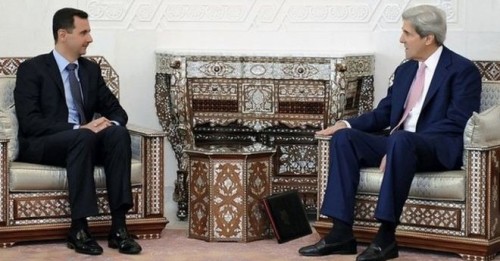PHOTO: President Assad with US Secretary of State John Kerry
Lars Hauch writes for EA:
When politicians insist that negotiations about Syria’s future must include talking to Bashar al-Assad, do they make him respectable?
That depends on your definition of “respectable”.
Does talking mean that politicians acknowledge him as an essential player in any effort to resolve the Syrian crises? Yes.
Does talking mean that they accept him as the legitimate President of Syria? Definitely not. Assad is going to be involved in any transition, but his personal destiny is another story.
In 2012, about 100 states already declared Assad to be an illegitimate representative of Syria. Since then, the President has been politically isolated, except for the ties to Iran, Russia, and Hezbollah on which he depends.
However, Russian President Vladimir Putin’s offensive — both in diplomacy and military intervention — is a new development in the intractable 4 1/2-year conflict. German Chancellor Angela Merkel’s statement that the West would have to talk to Assad to resolve the crisis made headlines, but she was only following up on the statement of US Secretary of State John Kerry who said that Assad’s removal would not have to be immediate. Even Turkish President Recep Tayyip Erdoğan, a visceral foe of his Syrian counterpart, said that Assad could be part of a transitional process.
None of this will make Bashar al-Assad respectable, but international politics are driven by interests and rarely by morals. It is in the interest of many players to find a solution for the Syrian conflict – or at least move towards it, and the announcement of possible talks with Assad simply reflects that reality. As unbearable as it may appear to talk to Assad — the President who is responsible for the majority of the 300,000 dead and 11 million displaced Syrians — on equal terms, there is no alternative.
As uncertain as all variables in the Syrian conflict are, one thing is certain: There will be no development towards a silencing of weapons as long as Assad can call himself “Syrian President”. But holding discussions with someone is not equivalent to supporting him.
Those talks will not take place in isolation from the battlefield. Asked how Riyadh would respond to Russian airstrikes, Saudi Foreign Minister Adel al-Jubeir said, “You’ll see.“
Whether that is going to be an increase in the supply of arms and financial aid to Syria’s rebels or more radical steps such as circumventing the embargo on anti-aircraft missiles is guesswork. However, it is certain that those powers backing the opposition will strengthen its military capacities in some way. Already that supply has helped rebels blunt the multi-front regime offensive — supported by Lebanon’s Hezbollah, Iranian-led units, and Russian air cover — with TOW anti-tank missiles, inflicting significant casualties on a Syrian military which lacks manpower.
The military pressure on the Assad regime is not likely to decrease, but that only bolsters the necessity in the long-term of negotiations to ensure the survival of military and economic groups who are currently propping up Assad.
In early September, the UN envoy for Syria, Staffan de Mistura, presented a plan for a “Transitional Governing Body“ including representatives from the government, the opposition, and civil society. Assad could take the role of a “ceremonial Head of State“, but without executive powers, while 120 members of his inner circle would be barred from public office.
Russia, Iran, and the opposition all prevented consideration of the plan. However, the political dynamics might be different if the proposal came from the Syrian business and military elites.
Assad’s rule is based on the binding of the existence of those elites to the President’s survival. But restarting dialogue could send a signal to those elites that Assad is not essential for their future, and conversely that failure to distance themselves from Bashar could be their demise.
This would not be the first time in history that an effective coup was spurred by the urge to survive among the elites. For that to happen in Syria, these groups need the assurance of diplomatic talks. Otherwise the elites will be stuck, for better or worse, with Assad. And for the foreseeable future, everyone else will be stuck as well.

